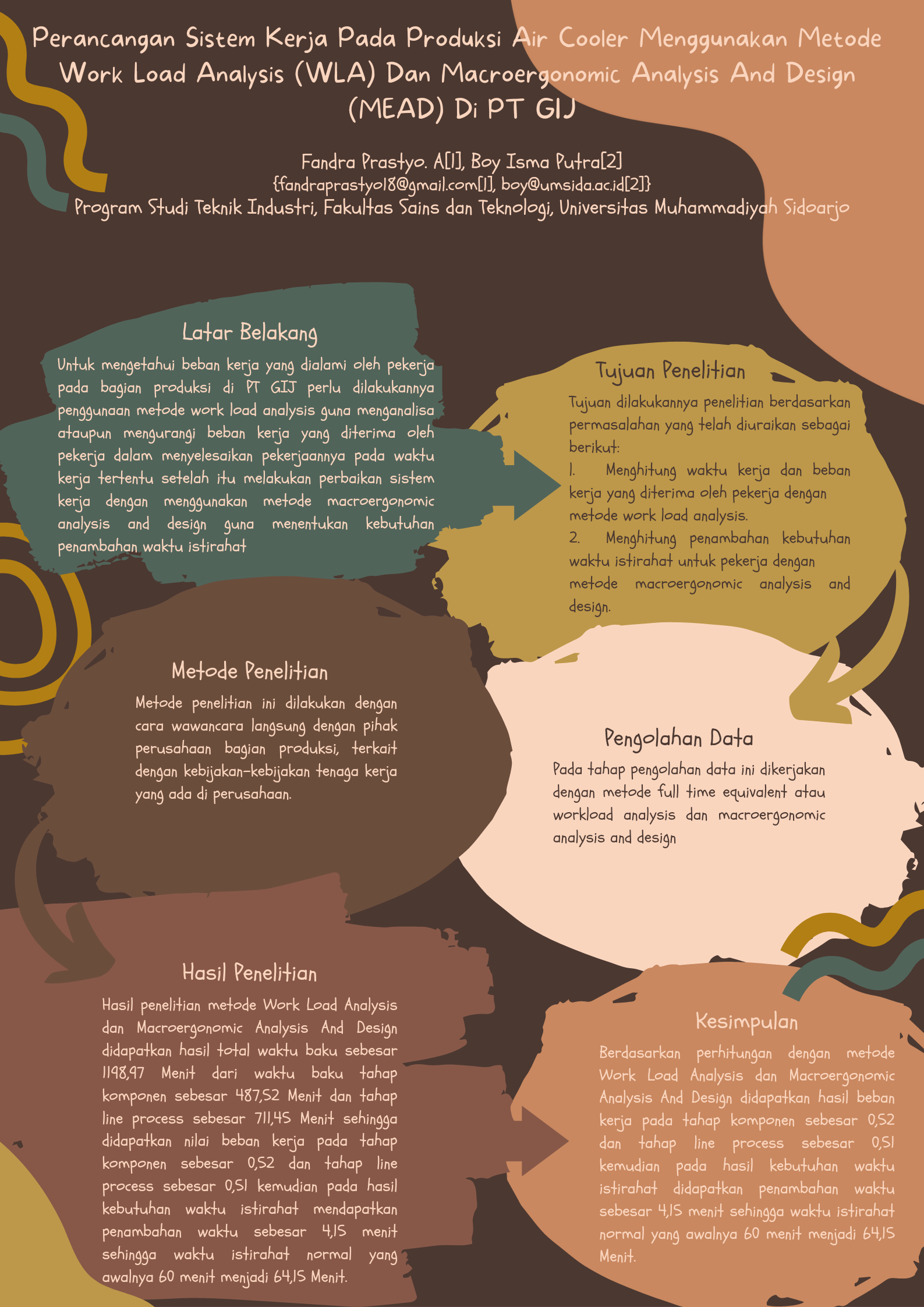Design of Work Systems in Air Cooler Production Using Work Load Analysis (WLA) and Macroergonomic Analysis and Design (MEAD) Methods at PT GIJ
Perancangan Sistem Kerja Pada Produksi Air Cooler Menggunakan Metode Work Load Analysis (WLA) dan Macroergonomic Analysis and Design (MEAD) di PT GIJ
DOI:
https://doi.org/10.21070/pels.v2i2.1291Keywords:
MEAD, Workload, Work System Design, Working Time, WLAAbstract
Air cooler is a system or machine designed to stabilize the air temperature and humidity in a certain area by circulating it. In the air cooler production process at PT GIJ, very high accuracy is also needed in the process and is still carried out by 1 worker in each part of the production process manually and the time it takes is relatively long up to more than 2 hours from normal time and results in employees fatigue easily. This study uses the work load analysis (WLA) method to reduce the workload obtained by completing the work at a certain working time and then improving the work system using the macroergonomic analysis and design (MEAD) method to determine the need for rest time in several production process activities. From the results of this study indicate the value of the workload after doing research using the work load analysis (WLA) method, the results of the workload at the component stage are 0.52 and the line process stage is 0.51 which means that from the stages of the production process each is declared to get a load. underload or normal work and the results obtained from the calculation of the need for rest time using the macroergonomic analysis and design (MEAD) method, the results of energy consumption are 2.52 kcal/minute and the results obtained are the need for rest time of 64.15 minutes so that the rest time needed by employees for stretching the body by 4.15 minutes outside the normal rest time of 60 minutes.
Downloads
References
Bakhtiar, “Pengukuran Beban Kerja dengan Metode Full Time Equivalent dan Penentuan Jumlah Tenaga Kerja Efektif Menggunakan Work Load Analysis,” Jurnal JIEOM, Vol. 4, No. 1, pp. 5-9, 2021.
Candrianto, “Analisis Beban Kerja Dan Jumlah Tenaga Kerja Pada Bagian Bahan Baku Menggunakan Metode Workload Analysis,” Industrial Vocational E-Journal On Agroindustry, Vol. 1, No. 1, pp. 36-43, 2020.
Darsini, “Analisis Jumlah Tenaga Kerja Optimal Dengan Metode Work Load Analysis (WLA) di PT. RSI, ”Journal of Applied Mechanical Engineering and Renewable Energy (JAMERE), Vol. 1, No. 1, pp. 24-29, 2021.
Dewanti. Galuh Krisna, “Analisis Metode Kerja Perakitan Kipas Angin Pada Proses Servis Kipas Angin Menggunakan Peta Tangan Kiri dan Tangan Kanan,” STRING, Vol. 5, No. 1, pp. 11-19, 2020.
Hakiim. Azafilmi, “Analisis Beban Kerja Fisik Dan Mental Menggunakan CVL Dan NASA-TLX Pada Divisi Produksi PT X,” Barometer, Vol. 3, No. 2, pp. 142-146, 2018.
Kurniawan. Hikmah Sidiq, “Analisis Beban Kerja Karyawan Pt Xyz Indonesia Pada Bagian Insulation Menggunakan Metode Full Time Equivalent,” STRING (Satuan Tulisan Riset dan Inovasi Teknologi), Vol. 5, No. 2, pp. 144-152, 2020.
Nurmianto. Eko, “Ergonomi Konsep Dasar dan Aplikasinya,” Guna Widya, 2008.
Pradini. Amirul Hafid, “Perbaikan Sistem Kerja Pendekatan Macroergonomic Analysis and Design (MEAD) untuk Meningkatkan Produktivitas Pekerja,” Jurnal OPSI, Vol. 12, No. 1, pp. 36-47, 2019.
Riyadi. Setyo, “Faktor Penyebab Terjadinya Kelelahan Kerja Pada Pekerj PT. Dungo Reksa Di Minas,” Jurnal Pengabdian Kesehatan Komunitas (Journal of Community Health Services), Vol. 1, No. 1, pp. 32-37, 2021.
Toka. Frengki Bung Kanisius, “Rancang Bangun Aplikasi Sistem Pakar Berbasis Android untuk Mendeteksi Kerusakan Pada Air Conditioner (AC),” Jurnal Ilmiah Bidang Teknologi Informasi dan Komunikasi, Vol. 4, No. 2, pp. 1-12, 2019.




